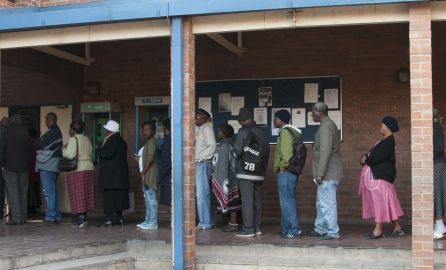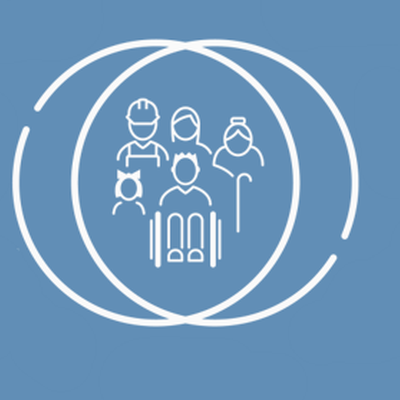Randomised control trials in South Africa have repeatedly shown that in-cash social transfers made to families with young children can have significant long-term positive impacts on the lives of those children and the future economic prospects of a country. Children in households receiving payments are typically taller, healthier and better educated and as a result grow into economically more productive adults.
The post-apartheid government of Nelson Mandela launched the Child Support Grant in South Africa in 1998 and after a slow start it has expanded to reach some 70% of households nationally, with notable results. Studies have shown that children receiving the grant get better food to eat, are more likely to attend school and less likely to join the labour market early.
|
A lesson for other nations? A social protection system that makes cash transfers to households with young children is already in place in Lesotho, a small Southern African country entirely surrounded by South Africa. They have drawn heavily on the South African model, again, with encouraging results. Researchers at EPRI have hosted a number of representatives from lower income or lower-middle income countries from across the world to see how cash transfers to households with children, as used in South Africa and Lesotho, might also be applied in their countries. |
“Evaluations in South Africa find that these child grants have very significant impacts in terms of improving nutritional outcomes, raising height by about three centimetres at age 10,” said Michael Samson, Director of Research at the Economic Policy Research Institute (EPRI), a non-profit research institute based in Cape Town, South Africa.
“Now three centimetres might not seem like much but that’s a proxy for a range of physical and cognitive outcomes that generate economic returns between 60 and 100% on top of the return to the government’s investment in these cash transfers,” Samson added. “That is for every hundred Rand the government has invested in these programmes for young children, these children get between 160 Rand and 230 Rand in future earnings over their lifetime.”
What’s more, the earlier the families receive the grant for their children, the more the children stand to benefit - with some surprising results.
“The most interesting result found was that adolescent girls who receive the child support grant in their very early years – in their first couple of years of life – those girls were far less likely to engage in the kinds of risky behaviours that put them at risk of HIV and AIDS infection,” said Samson.
In South Africa such behaviour change could prove crucial to slashing the country’s HIV and AIDS infection rates, which are among the highest in the world.
Findings also show that means testing or targeted cash transfers to only the very poorest households are less reliable.
“When the payments are unconditional and targeted very broadly to households with young children, without trying to target them too intensively on the poorest households – which sometimes backfires – then children receive these benefits more reliably and with fewer distortions that interfere with the impact and so they generate a greater developmental impact for the children,” Samson said.
Reforming Payment Systems in South Africa with TA from the EU
The creation of a specialised management institution, the South African Social Security Agency (SASSA), made delivery of all social grants transparent and independent from political considerations. Their Integrated Community Registration Outreach Program (ICROP) helps people living in hard-to-reach and remote areas who are often excluded from receiving social protection benefits.
EU-funded technical assistance is helping to patch social protection policy gaps, learn lessons from other countries and, crucially, make the process of grant distribution more effective.
|
The South African Grants System
South Africa has perhaps the most encompassing social protection system on the continent. The state has developed a number of grants for payment to vulnerable members of society like children, the disabled and the elderly to reduce poverty and better manage economic and social risks. The full list of grants available in South Africa include:
This video shows eligible South Africans queuing for their respective grants at a SASSA station in Johannesburg.
|
Presently, Child Support Grants are paid through a third party – Cash Paymaster Services – but that was found to be costly and had received criticism for being open to abuse by scammers and those who wanted to defraud the system. That system is set to be replaced, and the EU is supporting SASSA in the process to take over grant distributions and deal directly with South African grant recipients.
South Africans who are caregivers, the parents, grandparents or guardians responsible for a child under the age of 18 and earning less than 42,000 Rand or around €2,900 a year (84,000 Rand or equivalent of €5,800 for married couples), can claim a grant of 350 Rand or around €25 per month per child.
In a country where GDP per capita is around €7,000 per year according to the International Monetary Fund, such a grant payment can make a notable difference to household budgeting and living standards.
Once an application to receive the Child Support Grant is approved, grant recipients under the new system will be issued a card that carries their biometric information and can be used to withdraw grant payments in cash at an ATM or like a debit card used against purchases in selected shops. The new system is not expected to be fully up and running until 2019.
According to Zodwa Mvulane, Programme Manager for SASSA's Internal Payment System, SASSA hopes in future to add further enhancements to the payment system, such as implementing some kind of loyalty system that will encourage grant recipients to make healthy food purchases and so boost nutritional advantages for children in grant recipient households.
However, Mvulane stressed that SASSA will be making the most of EU- technical assistance throughout the implementation of the bio-metric cards to ensure that grant recipients are adequately educated about how the cards work and the benefits they can accrue.
“We have to have something that talks to the level of education of our own beneficiaries, something that takes them along with,” said Mvulane. “What we have observed, which was a challenge for us when we [first] introduced the debit card, beneficiary education - we did not do it thoroughly.”
“We need to take our clients and beneficiaries along,” said Mvulane. “Then they will know exactly what to do and what not to do.”
The EU has been supporting SASSA's Internal Payment System Programme since 2014 through two projects under the EU-SA Dialogue Facility. The ongoing project is scheduled to end in October 2017.





Log in with your EU Login account to post or comment on the platform.